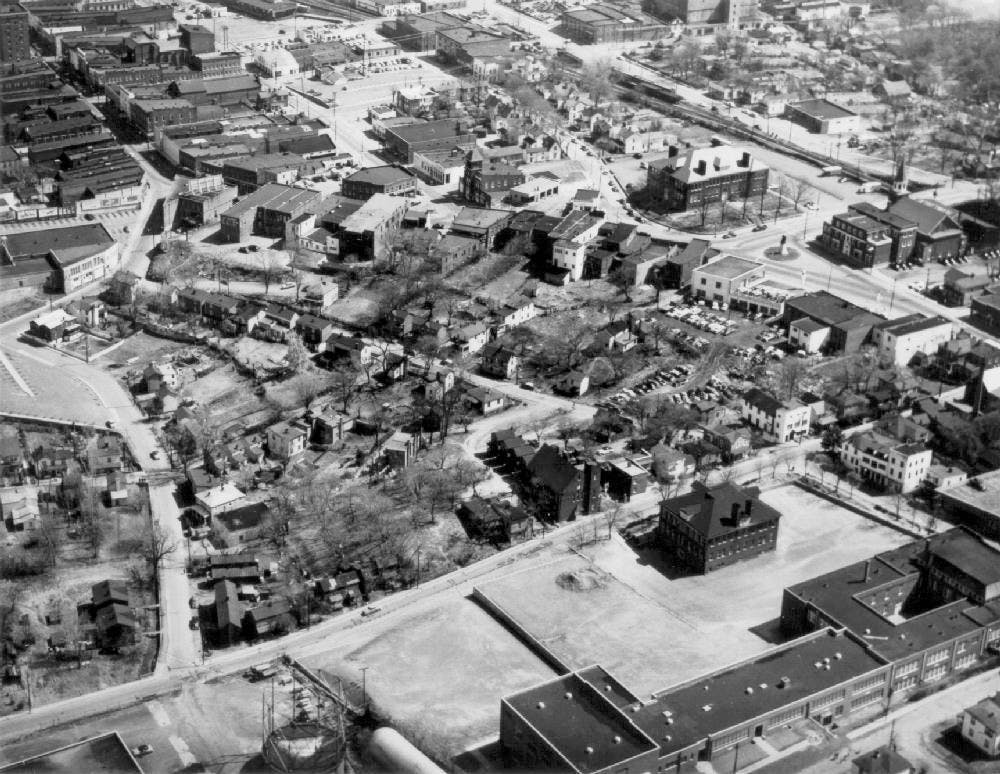Charlottesville Historic Resources Committee members have proposed the development of a park by the Omni Charlottesville Hotel downtown to commemorate Vinegar Hill, an African-American neighborhood demolished during the 1960s under the Federal Urban Renewal Program.
Under this plan, construction of Vinegar Hill Park would take place in two stages. First, signs designating the area as Vinegar Hill Park and historical markers detailing the history of Vinegar Hill would be put into place. The specifics of the second stage of implementation are yet to be determined but could include a mural and a monument.
Frank Dukes, founder of the University & Community Action for Racial Equity and a committee member of the Blue Ribbon Commission, said the urban renewal project was more than the destruction of people’s homes — it was the destruction of a vibrant community center.
“It was the heart of the African-American community in Charlottesville — the residential community, the church-going community, the business community,” Dukes said.
While many of the homes in Vinegar Hill had genuinely fallen into disrepair, Dukes said many others were still in good condition. Promises of reconstruction went unfulfilled, adding to the community’s turmoil following the demolition.
While the decision to raze Vinegar Hill came by public referendum, discrimination against African-American voters meant that very few of the community’s residents had a say in the fate of their own neighborhood.
This left a legacy of tremendous distrust, Dukes said.
“When people say Vinegar Hill, they’re basically saying that we can’t trust our government — we can’t trust the government to make choices that are good for us,” he said.
The new, historically detailed signage would replace the single plaque that currently marks the site. Although the Vinegar Hill community has largely disappeared physically, it has an extensive representation online in the form of historical research and documentation aggregated largely by University and community members.
Scot French, director of public history at the University of Central Florida, played a pivotal role in the collection of digital records concerning Vinegar Hill during his time at the University, where he served as assistant director of the Carter G. Woodson Institute and director of the Virginia Center for Digital History.
French — alongside Bill Ferster, director of Visualization for the Sciences, Humanities & Arts Network of Technological Initiatives at the University — compiled a tremendous amount of data on the neighborhood and made it accessible through a web portal called The Vinegar Hill Project.
“Our goal was to create a digital archive, sort of a virtual Vinegar Hill — a place where you could go and in some ways revisit the site through photographs, oral histories, visualizations,” French said.
French also produced a short documentary on the neighborhood, titled “That World is Gone: Race and Displacement in a Southern Town.” It won the Audience Award for Best Documentary Short at the 2010 Virginia Film Festival.
French said his extensive work in the digital memorialization of Vinegar Hill is limited by its distance from the public eye.
“It’s sort of hard to get the story out, you know, to the public, to people who aren’t looking for it,” he said. “If it’s a website, how do [you] know the website exists? If it’s a documentary film, how do you know where to find it?”
He hopes that the new signage will improve the accessibility of the history of Vinegar Hill and of the digital resources surrounding it.
“I’m just so happy to see these commemoration efforts,” French said. “I know a lot of people have been working for many years to bring the Vinegar Hill story to the public.”
The proposal for the park was made at a meeting on Sept. 1 of the HRC and the Blue Ribbon Commission on Race, Memorials and Public Spaces. It has yet to appear before Charlottesville City Council for approval.







